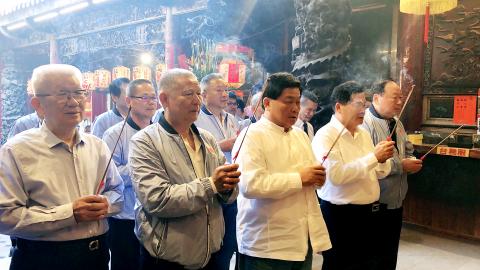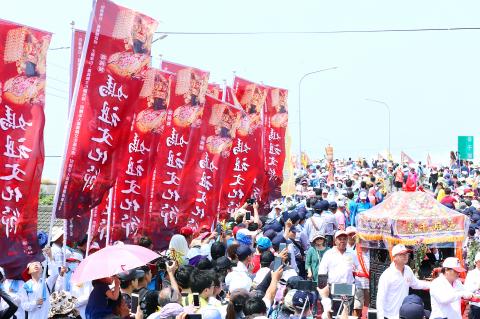The annual Dajia Matsu Pilgrimage has been postponed to comply with government measures aimed at preventing the spread of COVID-19, Jenn Lann Temple (鎮瀾宮) chairman Yen Ching-biao (顏清標) said yesterday, after sparking criticism on Wednesday for his insistence on holding the event.
Approximately 1 million people participate in the pilgrimage each year, with believers and visitors embarking on a 340km journey through central Taiwan and visiting more than 100 temples dedicated to the goddess Matsu along the route.
Yen had previously said that people should not be afraid to participate, because they would be protected by Matsu and other deities, while temple vice chairman Cheng Ming-kuen (鄭銘坤) said that the event would be canceled if Taichung was locked down because of the disease.

Photo: Chang Hsuan-che, Taipei Times
Yen yesterday apologized in a Facebook video to all followers of Matsu for having to postpone the event.
“Even President Tsai Ing-wen (蔡英文) has suspended all preparatory work for her inauguration ceremony on May 20 and made disease prevention the nation’s top priority. The pilgrimage can be held any time before the ninth day of the ninth month on the lunar calendar [Oct. 25 this year], which was said to be the day when the goddess ascended to the heavens,” Yen said.
“We will hold another meeting after the disease is under control to decide when the pilgrimage will be held. Matsu is merciful and she will bless everyone,” he said.

Photo: Tsai Tsung-hsun, Taipei Times
Yen said that he could not unilaterally decide to cancel the pilgrimage, as other people, including performing troupes for the parades and volunteers who cook meals, have been preparing for the event for months.
The temple on Wednesday night and yesterday morning held board meetings before deciding to postpone the event, he said.
Yen at a news conference yesterday morning denied that it was he who insisted that the event be held as scheduled and that the temple decided to postpone it because of pressure from Minister of Health and Welfare Chen Shih-chung (陳時中), who heads the Central Epidemic Command Center.
He consulted Chen by telephone because Chen is an expert in disease prevention, Yen said, adding that both would have had to work hard to contain the spread of the disease.
Yen said that he and the temple’s board of directors visited other temples in Changhua, Yunlin and Chiayi counties that are involved in the pilgrimage and explained the situation, adding that the reactions were mixed.
“You have to understand that they have to pay all the expenses themselves. We cannot settle this matter simply by making an announcement at a news conference or reimbursing them. You have to be more humane and considerate, and be more patient in explaining it to them,” Yen said.
The temple has donated NT$30 million (US$989,120) to help the government combat the spread of the disease, as it had pledged to do, he said.
Two other Matsu temples — Beigang Chaotian Temple (北港朝天宮) in Yunlin County and Baishatun Gongtian Temple (白沙屯拱天宮) in Miaoli County — have postponed their pilgrimages, which were scheduled for this weekend and next month respectively.
Tsai thanked Baishatun Gongtian Temple, Dajia Jenn Lann Temple and other temples nationwide for complying with the center’s advice to postpone or cancel religious activities.
The president wrote on Facebook that she fully felt the devotion, friendliness and warmth of Taiwanese when she joined Baishatun Gongtian Temple’s pilgrimage last year.
That adjustments could be made to coordinate between traditional rituals and disease-prevention efforts exemplify Taiwan’s beauty and are its most stabilizing power, she wrote, thanking all religious groups, who have been under pressure due to the issue, and their supporters.
The Ministry of Culture has listed the Dajia Matsu Pilgrimage one of the nation’s intangible heritages.
The Chinese Taipei Road Running Association yesterday said that the Taipei Freeway Marathon, which was scheduled for March 8, would also be postponed, while the Taishin Women Run would be postponed from March 29 to Aug. 23.

SECURITY: As China is ‘reshaping’ Hong Kong’s population, Taiwan must raise the eligibility threshold for applications from Hong Kongers, Chiu Chui-cheng said When Hong Kong and Macau citizens apply for residency in Taiwan, it would be under a new category that includes a “national security observation period,” Mainland Affairs Council (MAC) Minister Chiu Chui-cheng (邱垂正) said yesterday. President William Lai (賴清德) on March 13 announced 17 strategies to counter China’s aggression toward Taiwan, including incorporating national security considerations into the review process for residency applications from Hong Kong and Macau citizens. The situation in Hong Kong is constantly changing, Chiu said to media yesterday on the sidelines of the Taipei Technology Run hosted by the Taipei Neihu Technology Park Development Association. With

‘FORM OF PROTEST’: The German Institute Taipei said it was ‘shocked’ to see Nazi symbolism used in connection with political aims as it condemned the incident Sung Chien-liang (宋建樑), who led efforts to recall Democratic Progressive Party (DPP) Legislator Lee Kun-cheng (李坤城), was released on bail of NT$80,000 yesterday amid an outcry over a Nazi armband he wore to questioning the night before. Sung arrived at the New Taipei City District Prosecutors’ Office for questioning in a recall petition forgery case on Tuesday night wearing a red armband bearing a swastika, carrying a copy of Adolf Hitler’s Mein Kampf and giving a Nazi salute. Sung left the building at 1:15am without the armband and apparently covering the book with a coat. This is a serious international scandal and Chinese

A US Marine Corps regiment equipped with Naval Strike Missiles (NSM) is set to participate in the upcoming Balikatan 25 exercise in the Luzon Strait, marking the system’s first-ever deployment in the Philippines. US and Philippine officials have separately confirmed that the Navy Marine Expeditionary Ship Interdiction System (NMESIS) — the mobile launch platform for the Naval Strike Missile — would take part in the joint exercise. The missiles are being deployed to “a strategic first island chain chokepoint” in the waters between Taiwan proper and the Philippines, US-based Naval News reported. “The Luzon Strait and Bashi Channel represent a critical access

COUNTERINTELLIGENCE TRAINING: The ministry said 87.5 percent of the apprehended Chinese agents were reported by service members they tried to lure into becoming spies Taiwanese organized crime, illegal money lenders, temples and civic groups are complicit in Beijing’s infiltration of the armed forces, the Ministry of National Defense (MND) said in a report yesterday. Retired service members who had been turned to Beijing’s cause mainly relied on those channels to infiltrate the Taiwanese military, according to the report to be submitted to lawmakers ahead of tomorrow’s hearing on Chinese espionage in the military. Chinese intelligence typically used blackmail, Internet-based communications, bribery or debts to loan sharks to leverage active service personnel to do its bidding, it said. China’s main goals are to collect intelligence, and develop a